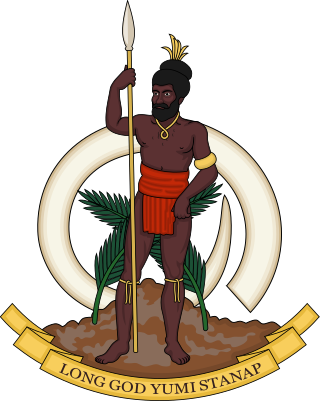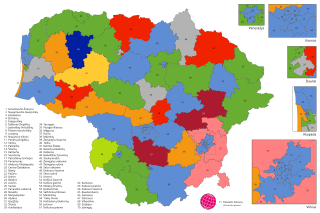
Mixed-member proportional representation is a mixed electoral system which combines local majoritarian elections with a compensatory tier of party list votes, which are used to allocate additional members in a way that aims to produce proportional representation overall. In most MMP systems, voters get two votes: one to decide the representative for their single-seat constituency, and one for a political party. Some countries use single vote variants of MMP, although this article focuses primarily on dual vote versions of MMP.

Electoral reform in New Zealand has been a political issue in the past as major changes have been made to both parliamentary and local government electoral systems.

The 1999 New Zealand general election was held on 27 November 1999 to determine the composition of the 46th New Zealand Parliament. The governing National Party, led by Prime Minister Jenny Shipley, was defeated, being replaced by a coalition of Helen Clark's Labour Party and the smaller Alliance. This marked an end to nine years of the Fourth National Government, and the beginning of the Fifth Labour Government which would govern for nine years in turn, until its loss to the National Party in the 2008 general election. It was the first New Zealand election where both major parties had female leaders.
Regular elections in Croatia are mandated by the Constitution and legislation enacted by Parliament. The presidency, Parliament, county prefects and assemblies, city and town mayors, and city and municipal councils are all elective offices. Since 1990, seven presidential elections have been held. During the same period, ten parliamentary elections were also held. In addition, there were nine nationwide local elections. Croatia has also held three elections to elect members of the European Parliament following its accession to the EU on 1 July 2013.

Elections in Kenya take place within the framework of a multi-party democracy and a presidential system. The President, Senate and National Assembly are directly elected by voters, with elections organised by the Independent Electoral and Boundaries Commission (IEBC).
Elections in Hungary are held at two levels: general elections to elect the members of the National Assembly and local elections to elect local authorities. European Parliament elections are also held every 5 years.

Parliamentary elections were held in Kyrgyzstan on 27 February and 13 March 2005. The belief that the elections had been rigged by the government led to widespread protests, culminating in the Tulip Revolution on 24 March in which President Askar Akayev was overthrown.

The New Zealand electoral system has been mixed-member proportional (MMP) since the 1996 election. MMP was introduced following a referendum in 1993. It replaced the first-past-the-post (FPP) system New Zealand had previously used for most of its history. Under MMP, New Zealanders have two secret ballot votes to elect members of Parliament (MPs). The first vote is for a candidate from an electorate, a geographic electoral district. The second is the party vote for the political party the voter wants to form the government.

Parliamentary elections were held in Kiribati on 22 August 2007 and 30 August 2007, within 23 constituencies to elect 44 MPs. Two other MPs are ex officio members.

General elections were held in Tonga on 23 and 24 April 2008 to elect members of the Legislative Assembly. The nobles were elected on 23 April, and the nine people's representatives on 24 April. A total of 32,000 people turned out to vote, giving a turnout of 48%.
Early general elections under a new electoral law were held in Tonga on 25 November 2010. They determined the composition of the 2010 Tongan Legislative Assembly.
Parliamentary elections were held in Tuvalu on 16 September 2010. Voters elected fifteen members of the Parliament to a four-year term. All candidates were independents, as there are no political parties in the country. Ten out of the fifteen incumbent members were re-elected. The remaining five incumbents, including Deputy Prime Minister Tavau Teii, did not retain their seats. The incumbent Prime Minister, Apisai Ielemia, retained his seat in Vaitupu constituency. On 29 September, Maatia Toafa from Nanumea won eight of the fifteen votes to become Prime Minister.

Parliamentary elections were held in Kiribati on 21 and 28 October 2011. In the first round, exactly half of the 44 members of parliament were elected, with the remainder chosen in the proceeding run-off elections. 30 candidates were reelected, and four government ministers lost their seats. One seat had to go to a third round of elections due to two candidates tying in the second round. In the third round, Jacob Teem defended his seat against Rutio Bangao with just 27 votes difference.

Presidential elections were held in Kiribati on 13 January 2012, following two-round parliamentary elections held in October 2011. Incumbent President Anote Tong sought re-election to a third four-year term, ending months of speculation about his decision.

Parliamentary elections were held in Nauru on 8 June 2013. After Parliament was dissolved on 1 March, the elections were set for 6 April. However, a Supreme Court ruling annulled the dissolution and cancelled the elections. Parliament was dissolved again on 23 May, approximately one month before the normal end of its mandate, and elections were set for 22 June 2013, however President Sprent Dabwido declared a state of emergency and brought the election forward to 8 June. Parliament first sat on June 11 and Fisheries Minister Baron Waqa, the leader of the government forces, was elected president.

General elections were held in Vanuatu on 22 January 2016. The previous elections occurred in October 2012. The president of Vanuatu, Baldwin Lonsdale, dissolved the Parliament of Vanuatu in November 2015. This occurred after the conviction of 14 parliamentarians for bribery. The convicted MPs include former Prime Ministers Serge Vohor and Moana Carcasses Kalosil. The president called for a snap election to form a new government.

Parliamentary elections were held in Nauru on 9 July 2016. Parliament was dissolved by President Baron Waqa on 10 June after it completed its three-year term. Speaker Ludwig Scotty called the elections for 9 July, with nominations taking place between 19 and 25 June.

Parliamentary elections were held in Nauru on 24 August 2019. President Baron Waqa lost his seat in Boe Constituency, making him ineligible for a third term. Following the elections, Lionel Aingimea was elected President, winning a parliamentary vote 12–6 against David Adeang.

Parliamentary elections were held in Kiribati in 2020 to elect members of the House of Assembly. The elections were originally planned on 7 April 2020, with a second round of voting to be held on 15 April 2020. However, in late March the Electoral Commission changed the voting date to 14 April 2020, with a second round on 21 April 2020.

Parliamentary elections were held in Lithuania on 11 and 25 October 2020 to elect the 141 members of the Seimas. 71 were elected in single-member constituencies using the two-round system, and the remaining 70 in a single nationwide constituency using proportional representation. The first round was held on 11 October and the second round on 25 October.











